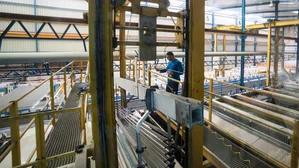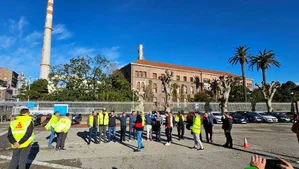Logistics Strike at Solvay Continues Amid New Disagreement

In the midst of the holiday season, a significant labor dispute is unfolding at the Solvay logistics facility in Spain, affecting both the local community and the broader industrial landscape.
Background of the Strike
The strike, which began in recent weeks, involves logistics workers at Solvay, a multinational chemical company with a substantial presence in Spain. The workers are demanding better working conditions, improved wages, and enhanced job security, issues that have been at the forefront of labor negotiations.
New Disagreement Emerges
On December 23, 2024, the situation took a turn for the worse as a new disagreement arose between the workers and the management. Despite previous rounds of negotiations, the parties have failed to reach a mutually acceptable agreement. This latest impasse has prolonged the strike, causing disruptions in the supply chain and impacting the company's operations.
Worker Demands
The striking workers, represented by local labor unions, are insisting on several key demands. These include a significant increase in wages to match the rising cost of living, improved working hours, and enhanced safety measures at the workplace. The workers also seek greater job stability, as many are concerned about the potential for layoffs and outsourcing.
Impact on the Community
The ongoing strike is not only affecting the workers directly involved but also has a ripple effect on the local community. Local businesses that rely on the logistics services provided by Solvay are facing delays and increased costs. Additionally, the strike is drawing attention to broader labor issues in Spain, highlighting the need for better working conditions and labor protections across various industries.
International Context
This labor dispute is part of a larger trend of worker activism seen globally. In recent years, there has been a surge in strikes and labor protests in various sectors, from automotive to technology, as workers push for better rights and conditions. The response of companies like Solvay to these demands will be closely watched, as it sets a precedent for labor relations in the region.
Future Outlook
As the strike continues, both sides are under pressure to find a resolution. The workers remain resolute in their demands, while the company is facing increasing pressure from stakeholders and the community to address the issues. The outcome of this dispute will have significant implications for labor relations in Spain and could influence similar disputes in other industries.
For expats living in Spain, this strike serves as a reminder of the ongoing labor challenges and the importance of strong labor protections. As the situation evolves, it will be crucial to monitor the developments and the eventual resolution, which could have far-reaching consequences for workers and businesses alike.
Related Stories

Over 2,600 Aspirants Participate in Initial Public Employment Exams for 2023-2024 in Suffolk and Monroe Counties
Over 2,600 candidates vie for public sector roles in Suffolk and Monroe counties, marking a keen interest in civil service careers for 2023-2024.

Cantabria Leads in Creation of Indefinite Employment Positions Following Labor Reform
Cantabria leads Spain in creating stable jobs post-labor reform, setting a positive precedent for national employment stability and growth.

New Mediation Called in Solvay Logistics Strike in Spain
In a bid to resolve the ongoing strike at Solvay's Spanish logistics division, Orecla announces a new mediation session, aiming to reconcile worker demands with company operations.

Significant Changes in Labor Laws and Housing Regulations in Spain: What Expats Need to Know
Spain introduces major labor and housing law reforms, impacting expats with changes to temporary contracts, eviction procedures, and climate-related labor measures.

Spain Set to Implement Shorter Work Week Starting 2025
Spain to reduce its work week to 37.5 hours by 2025, aiming to improve work-life balance for 12 million employees, following an agreement led by Labour Minister Yolanda Díaz.